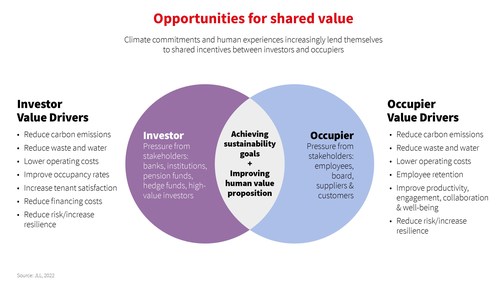As businesses grapple with the current energy crisis and prepare for it to worsen, new research from JLL finds that these rising energy costs are expediting the move toward more efficient buildings.

JLL’s Retrofitting Buildings to be Future-Fit research reveals that net-zero carbon (NZC) intervention measures directly impact a building’s bottom line and that failing to decarbonize leads to significant financial risk. For many buildings, meeting 2050 decarbonization targets put forward in the Paris Climate Agreement is grounded in retrofitting current spaces, which can also garner higher rents, reduce financial risk and generate higher occupancy rates and tenant satisfaction.
“Retrofitting existing buildings is the quickest and most cost-effective way to accelerate decarbonization in the built environment,” said Guy Grainger, JLL global Head of Sustainability Services and ESG. “Whether it is lenders on real estate or occupiers of buildings, requirements are changing and real assets will become illiquid unless there is a plan to transition them.”
JLL’s research reveals that in the global north, retrofitting rates need to triple from barely 1% today to at least 3% of existing buildings per year to meet decarbonization targets. An estimated US $3 trillion will be required in the office sector alone to meet these targets. In the developing world, new commercial and residential real estate will need fresh approaches prioritizing carbon and energy efficiency to improve resilience to climate change and contribute to a more sustainable future. Addressing the knowledge gap, upskilling the workforce and scaling technology will be critical to accelerating the pace of retrofitting.
“Retrofitting does not need to be an all at once endeavor. But, reporting and disclosure is not enough – this requires intentional investment and a strategic approach,” said Grainger. “Retrofits are both more viable and responsible when considered in tandem with broader asset repositioning that responds to changing workplace dynamics and climate resilience. We have enough proof points that show we have been underestimating the return upside of intervention and underestimating the value downside of inaction.”
Retrofitting buildings to be more energy efficient will also require owners and occupiers to deepen relationships and form new business models to gain the significant value they both have when investing in sustainability. The alignment of stakeholders extends beyond just the landlord and tenant as suppliers, building operators, management teams, on-site teams, and even local governments must work together to transition to a low-carbon economy.
The Retrofitting to be Future-Fit report with expert insights on how companies and those invested in the global real estate economy can successfully decarbonize their real estate will be discussed during the Retrofitting and Resilience webinar on Nov.10, 2022, at 3 pm GMT/9 am CT/10 am ET as part of COP27.
About JLL
JLL is a leading professional services firm that specializes in real estate and investment management. JLL shapes the future of real estate for a better world by using the most advanced technology to create rewarding opportunities, amazing spaces and sustainable real estate solutions for our clients, our people and our communities. JLL is a Fortune 500 company with annual revenue of $19.4 billion, operations in over 80 countries and a global workforce of more than 102,000 as of September 30, 2022. JLL is the brand name, and a registered trademark, of Jones Lang LaSalle Incorporated. For further information, visit jll.com.
Contact: Gayle Kantro
Phone: (312) 228-2795
Email: Gayle.Kantro@am.jll.com